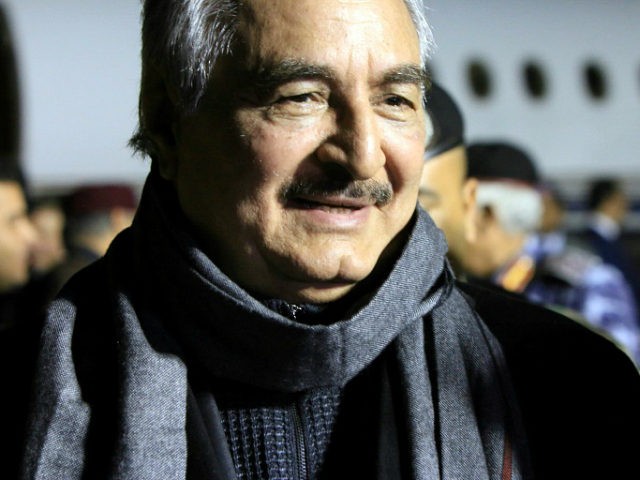The U.S. military over the weekend announced that it had “temporarily” withdrawn a small contingent of American troops from Libya “due to increased unrest” in Tripoli following the decision by renegade warlord Khalifa Haftar to advance his army towards the capital.
Haftar enjoys support from Russia, France, and neighboring Egypt, among other countries.
“The security realities on the ground in Libya are growing increasingly complex and unpredictable,” Gen. Thomas Waldhauser, the chief of U.S. Africa Command (AFRICOM), declared in a statement issued Sunday. “Even with an adjustment of the force, we will continue to remain agile in support of existing U.S. strategy.”
In recent years, a small contingent of U.S. troops have been helping local forces protect diplomatic facilities as well as combat the Islamic State (ISIS/ISIL) and al-Qaeda jihadis who have found a fertile ground for their activities amid the chaos that has engulfed Libya since the U.S.-backed overthrow and death of dictator Muammar Gaddafi in 2011.
Libya’s strongman Gen. Khalifa Haftar, the chief of the Libyan National Army (LNA) that backs the Tobruk-based breakaway government, has surfaced as the top rival of the United Nations and U.S.-backed Government of National Accord (GNA) led by Prime Minister Fayez Serraj.
Propped up by Russia, France, the United Arab Emirates (UAE), Saudi Arabia, and neighboring Egypt, Gen. Haftar’s LNA has seized most of Libya, including most border crossings and the majority of the lucrative onshore oil fields.
Since Thursday, Haftar has been pushing into Tripoli, home to the U.N. and U.S.-backed government of PM Serraj.
In Sunday’s statement, AFRICOM explained:
Due to increased unrest in Libya, a contingent of U.S. forces supporting U.S. Africa Command temporarily relocated from the country in response to security conditions on the ground. … U.S. Africa Command is conducting prudent military planning while continuing to assess the security situation. The command is making the personnel adjustments in response to the evolving security situation. U.S. Africa Command will continue to monitor conditions on the ground in Libya, and assess the feasibility for renewed U.S. military presence, as appropriate.
U.S. Secretary of State Mike Pompeo also warned Haftar against advancing towards Tripoli in a statement also issued on Sunday:
The United States is deeply concerned about fighting near Tripoli. We have made clear that we oppose the military offensive by Khalifa Haftar’s forces and urge the immediate halt to these military operations against the Libyan capital. Forces should return to status quo ante positions. All involved parties have a responsibility to urgently de-escalate the situation, as the UN Security Council and G7 ministers emphasized on April 5.
This unilateral military campaign against Tripoli is endangering civilians and undermining prospects for a better future for all Libyans.
Pompeo stressed that “a political solution,” not a military one, “is the only way to unify the country and provide a plan for security, stability, and prosperity for all Libyans.”
Forces loyal to the internationally-recognized government have vowed to defend Tripoli from Haftar and his LNA fighters.
On Sunday, Mohammed Gununu, a spokesman for the pro-Serraj Libyan Army, announced the launching of the “Volcano of Rage” operation to defeat what he described as Haftar’s coup attempt.
“We announce the start of the Volcano of Rage military campaign against the armed forces [of Haftar],” the spokesman proclaimed, according to Russia’s state-owned TASS news agency. “We have formed an operative staff including units of the armed forces and the interior ministry. We will not allow the creation of a military state and we will continue to support Libya’s democratic development.”
“The Libyan Army rejects coups and militarization of the state. Libya will always be a civilian state and the army will protect it and secure the people.” Gununu added, the Libya Observer reports.
On April 4, Gen. Haftar ordered his LNA troops to march on Tripoli, prompting PM Serraj to order all fighters loyal to the GNA to use force if necessary “to defend the civilian population and critical facilities.”.
“Forces under the command of Libya’s renegade General Khalifa Haftar are believed to have launched an air raid against the only functioning airport in Tripoli as heavy fighting rages for control of the capital,” Al Jazeera reports.
According to the U.N., the ongoing violence in Tripoli has already displaced 2,800 people. Clashes have also killed at least 35 people and wounded another 80, including civilians, since Haftar’s orders on Thursday, the Guardian reports, citing the health ministry of the Tripoli-based government.
Libya has descended into political and security chaos as the rival governments in Tripoli and Tobruk, as well as several regional militias, vie for power and influence since Gaddafi’s demise in 2011. Jihadis are also operating across the North African country.
Haftar has liberated several areas from the grip of jihadis. However, some human rights groups have accused the strongman general and his LNA fighters of war crimes.
Moreover, France24 notes, “While Haftar has sold himself to the West as an anti-Islamist fighter, experts say he has close links to a branch of Salafists called Madkhalists.”
On Monday, unnamed sources from the French government denied any prior knowledge of Haftar’s assault on Tripoli, emphasizing that France is not trying to undermine U.N. efforts to reach a peace pact between the strongman general and PM Serraj.
The Guardian reports:
The French officials insist they were ignorant of Haftar’s plan, a claim that is challenged by some Libyan observers who argue the French not only have have special forces embedded in the country, but have done more than any other European country to provide Haftar with international respectability. The French have argued that Haftar’s elite forces are a reality that simply cannot be ignored in a search for peace.
Russia has been more forthcoming about its support for Haftar, blocking a U.K.-led move to approve a security council statement condemning the warlord at the U.N. headquarters in New York on Sunday, insisting all sides should be urged to show restraint.

COMMENTS
Please let us know if you're having issues with commenting.